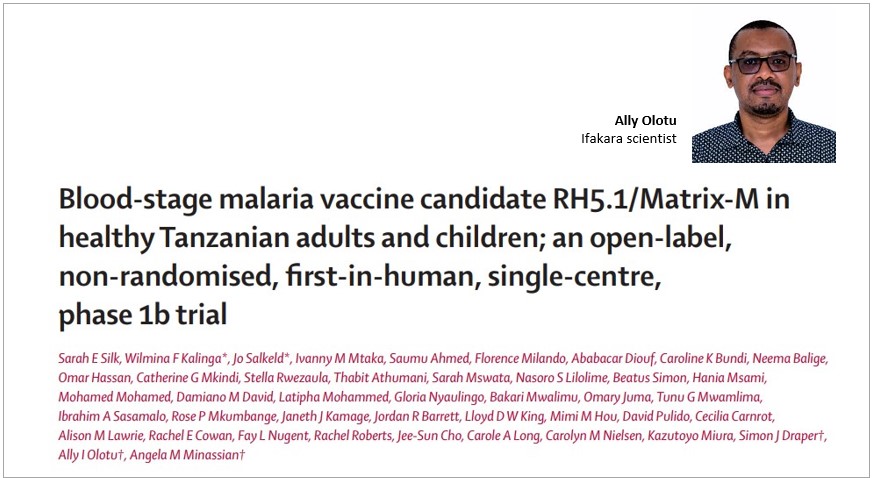
MALARIA VACCINE: New candidate shows promise in early trials

A new malaria vaccine candidate, RH5.1/Matrix-M, has shown promising results in early clinical trials, confirming its safety and effectiveness in preventing malaria. The study was conducted at the Ifakara Health Institute Clinical Trials Facility in Bagamoyo, Tanzania.
The clinical trial was led by a team of scientists from the University of Oxford (UK) and Ifakara Health Institute (Tanzania), in collaboration with colleagues from the National Institutes of Health (USA), KEMRI-Wellcome Trust Research Programme (Kenya), Muhimbili National Hospital (Tanzania), and Novavax AB (Sweden) – involving healthy adults and young children.
About the RH5.1/Matrix-M
RH5.1/Matrix-M is a soluble protein vaccine candidate for blood-stage malaria which is formulated with the Matrix-M adjuvant to assess safety and immunogenicity in a malaria-endemic adult and pediatric population for the first time.
Safety profile of the vaccine
The vaccine was found to be favorably safe and, despite a few serious health issues occurring during the trial among the participants, it was confirmed that none were linked to the vaccine.
“There were no safety concerns during the course of the trial,” reported the scientists in their paper published on The Lancet journal. “Most local solicited adverse events in both adults and children were graded as mild to moderate in severity. Severe local solicited adverse events (i.e., swelling and skin induration) were reported in one adult and three children.”
The trial, conducted in 2021, involved 60 healthy participants, including 12 adults aged 18-45 years and 48 children aged 5-17 months. Each participant received the vaccine in various doses, with the primary goal of evaluating safety and immune responses.
Encouraging immune, antibody responses
According to the scientists, the study's outcomes are encouraging, demonstrating that the vaccine was well-tolerated across all age groups, with no serious adverse events related to the vaccination.
Notably, the trial found that the RH5.1/Matrix-M vaccine induced strong immune responses – the highest level reported in vaccinated humans to date. These findings align with similar studies conducted in the UK.
Findings also showed strong antibody responses with children showing particularly high levels of antibodies.
Progress to phase 2b trials
As a result of the successful responses, the RH5.1/Matrix-M vaccine has progressed to a phase 2b trial (currently ongoing) in 5-17-month-old children in Burkina Faso to assess its efficacy against clinical malaria for the first time.
What are the next steps?
The successful trial marks a significant milestone in malaria vaccine research. Following the study findings, scientists underline the need for further efficacy assessment of the RH5.1/Matrix-M vaccine, particularly in young African children, who bear the highest burden of malaria-related disease and death.
Funding and support
The clinical study, completed in July 2023, was funded by a consortium of international organizations, including the European and Developing Countries Clinical Trials Partnership, the UK Medical Research Council, the UK Department for International Development, the National Institute for Health and Care Research Oxford Biomedical Research Centre, the Division of Intramural Research, National Institute of Allergy and Infectious Diseases; the US Agency for International Development, and the Wellcome Trust.
Ifakara team behind the trial
Twenty-two Ifakara Health Institute scientists led by Dr. Ally Olotu contributed to this clinical study. They include Wilmina Kalinga, Saumu Ahmed, Florence Milando, Neema Balige, Omar Hassan, Catherine Mkindi, Thabit Athumani, Sarah Mswata, Nasoro Lilolime, Beatus Simon, Hania Msami, Mohamed Mohamed, Damiano David, Latipha Mohammed, Gloria Nyaulingo, Bakari Mwalimu, Omary Juma, Tunu Mwamlima, Ibrahim Sasamalo, Rose Mkumbange and Janeth Kamage.
Read the publication here.
